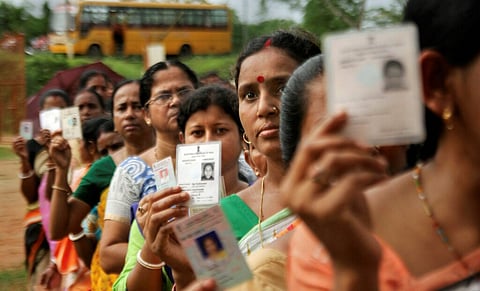

Follow TNM’s WhatsApp channel for news updates and story links.
The Telangana government under Bharat Rashtra Samithi (BRS) allegedly misused electoral roll photos for facial recognition, Hyderabad-based researcher and activist Srinivas Kodali has complained to the Chief Electoral Officer (CEO) of Telangana. He has demanded the deletion of all Electoral Photo Identity Card (EPIC) photos from any agencies other than the Telangana Chief Electoral Officer’s office.
Srinivas Kodali, a researcher on digitisation advocating for digital privacy rights, cited government documents that show the Telangana government’s Information Technology Department using EPIC photos for facial recognition.
These EPIC photos were used for facial recognition for identity verification on T App Folio, an app for remotely providing government services such as driving license renewal, life certificate for pensioners, etc.
According to Srinivas, it is likely that the state government is in possession of EPIC data due to the Aadhaar-voter ID linkage performed in Telangana in 2015.
Another possibility, he said, is that the EPIC data is from a pilot project of facial recognition for voter verification carried out in 2020. The legality of this pilot was also questioned by digital rights advocates at the time.
In either case, using EPIC photos for facial recognition has no legal basis, Srinivas has argued. He contended that the Representation of People's Act, 1950, and associated rules allow electoral officers to collect and maintain voter rolls “solely for electoral purposes”.
“They do not authorise sharing with state governments or use for facial recognition. Such actions are patently unlawful,” Srinivas said in his complaint to the CEO, arguing that the process violates the Supreme Court’s Puttaswamy judgment on right to privacy.
Srinivas alleges that the government used this data for a range of purposes beyond elections.
Srinivas Kodali has submitted a state government presentation to support his complaint. The document, from the IT Department in February 2023, shows that the government's facial recognition system, called Real-time Digital Authentication of Identity (RTDAI), used electoral roll photos and details for identity verification.
This system was used for pension related services on the T Folio app, allowing pensioners to verify their identity without visiting a government office. T Folio app is owned and managed by Telangana government.
The presentation also revealed that the IT Department used facial recognition for a pilot project on voter identification during the 2020 municipal elections in Kompally. This technology was developed by a department under the state government itself. Srinivas found the presentation on a government training institute's website.
Telangana had started to link Aadhaar numbers to voter IDs under a programme of the Election Commission of India, but it was stopped by the Supreme Court in 2015. However, a letter in April 2018 from the Andhra Pradesh CEO to the Election Commission of India shows that by then, Aadhaar numbers for 1.83 crore voters (about 71% of the total) had already been linked to their voter IDs.
The data from this project was then used to delete around 30 lakh voter names in the 2018 Telangana Assembly elections. This was done using a software to find duplicate entries, but without proper door-to-door checks or notices to the affected voters.
The voter data was also shared with a large government database called the State Resident Data Hub (SRDH). This database, which was created from a 2014 statewide survey, contains a 360-degree profile of citizens, including their Aadhaar, voter ID, and other personal details. The same system was also used by the Hyderabad Police to create an ‘Integrated Information Hub’ (IIH).
According to Srinivas, the SRDH, or the Samagra Vedika, or the Integrated People Information Hub (IPIH) – all names of databases with 360-degree citizens’ profiles initiated under BRS – come under the same system and can access the same data.
Documents accessed by activist SQ Masood under the RTI show that a technology company accessed this voter data to integrate it with information on pensioners for a pension verification system. Posidex Technologies Private Limited was a company that developed Samagra Vedika and IPIH. This suggests that electoral data was being used for purposes other than elections.
Questioning the legality of these agencies using the EPIC database for purposes unrelated to elections, Srinivas has demanded that the Telangana CEO commission an independent inquiry into how these photographs were misused.
He has also asked the CEO to stop further sharing of electoral roll data with any external agency including the Telangana government, and explain the legal grounds for having shared the data with the government.